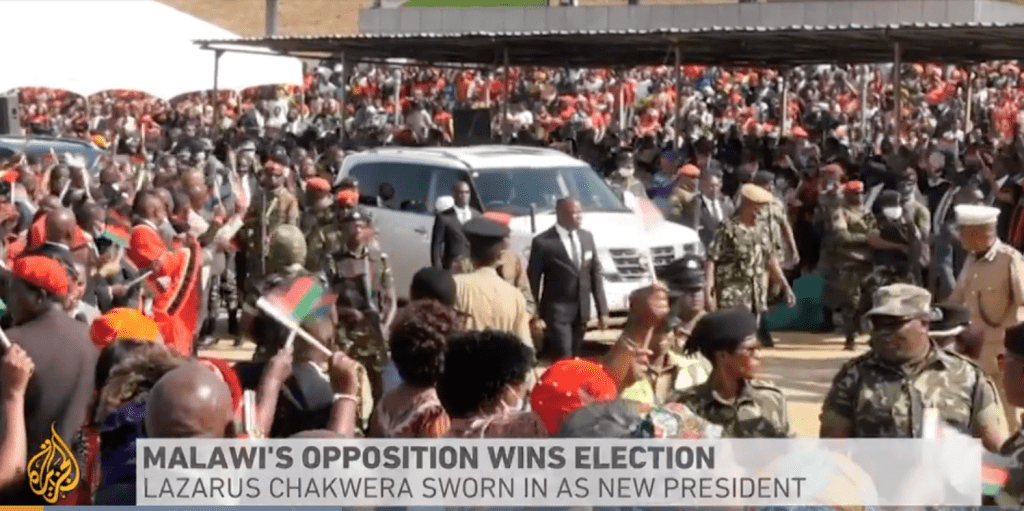Norman Chisale for years headed the security detail of Malawi’s ex-President Peter Mutharika. Now he faces corruption charges.
Blantyre, Malawi – For years, Norman Chisale was known as the “most trusted and feared” bodyguard of Peter Mutharika, Malawi’s former president. It seems he was also the “richest”.
In news that stunned Malawi, state authorities last month seized property belonging to Chisale, as well as his close associates and relatives, worth an estimated $2.2m.
The seized high-value assets included more than 80 vehicles, ranging from Mercedes Benzes and Range Rovers to Land Cruisers and Jeep Wranglers, as well as 21 properties, including residential houses and commercial buildings. The state also froze two bank accounts registered in Chisale’s name containing a combined sum of nearly $150,000.
The moves by the anti-corruption prosecutors and investigating authorities are linked to a multimillion-dollar deal in which Chisale, 45, is accused of fraudulently using Mutharika’s tax exemption number to import cement in 2017-2018.
The office of the Director of Public Prosecutions and the Anti-Corruption Bureau had jointly applied for the preservation order, saying “there are reasonable grounds to believe that the assets are the proceeds of a crime”.

But Chancy Gondwe, Chisale’s lawyer, said his client on Thursday will appeal the Blantyre high court’s order that allowed the authorities to seize the property.
“We do not believe that the state provided reasonable grounds for the court to grant that order because the listed properties do not belong to him,” Gondwe told Al Jazeera. “Importation and ownership of property are different concepts altogether.”
Chisale himself has said in interviews that some of the vehicles were gifted to Mutharika and his job was to receive them and then give them to the president’s intended recipients – ranging from relatives of Mutharika to religious chiefs and local chiefs. He has not said how many vehicles actually belong to him.
Mutharika has denied any involvement or knowledge of his bodyguard’s alleged activities.
The revelations about Chisale’s enormous wealth have shocked Malawians, especially the youth who are the majority in a country where about half of the mainly farming population live in poverty.
Chisale began his career in military intelligence before getting a job in 2009 as a valet to the then-president, Bingu wa Mutharika, the late brother of Peter Mutharika.
After Bingu wa Mutharika died in office in 2012, Chisale began working for his brother who went on to serve as president from 2014 until June last year.
The private bodyguard was not a well-known public figure, nor he was known to be rich, before Peter Mutharika won the presidency. But things quickly changed after that.
Critics began pointing out that Chisale had become too powerful at the State House. Members of Mutharika’s party accused him of blocking them from having access to the president, with some threatening to leave the party if the “greedy” security aide was not removed from his position.
Chisale also made headlines in 2019 when he was accused of taking part in a vehicle-duty evasion fraud, and raised eyebrows after reports said he had spent large sums to build a church in his home district.
All that on a reported monthly salary of about $1,500 after taxes while working for the president.
“Even factoring in per diems and allowances, which could have raised Chisale’s monthly income to 6.2-million kwacha [about $8,000], it would have taken him 274 years to earn his current wealth,” the Mail & Guardian reported earlier this month.
Mutharika was defeated in June 2020 elections, and his successor, Lazarus Chakwera, declared he will “clear out the rubble of corruption”.
It did not take long for Chisale to gain the attention of the police. He is currently facing multiple charges, including over the murder of the anti-corruption bureau director, manslaughter and abuse of office.
He is out on bail and usually displays a Bible during court appearances.
Political commentator Sheriff Kaisi said the latest corruption case portrayed Malawi in a particularly bad light and raised many questions about how one individual could allegedly accumulate so much wealth in one of the world’s poorest countries.
“Even the state is shivering, looking at the wealth,” Kaisi told Al Jazeera. “But at the same time, this is just a drop in the ocean.”
Malawi was ranked 129th out of 180 countries on Transparency International’s Corruption Perception Index last year, having dropped seven spots since 2012.
“Notorious for the ‘cash-gate scandal’ of 2013, involving high levels of public sector corruption and misappropriation of funds, the country continues to grapple with corruption,” reads the brief on Malawi.
“A recent government audit revealed public sector corruption of astronomical proportions, with an estimated US$1 billion allegedly stolen by the previous government.”
While a number of officials from the previous government have been arrested over alleged corruption and fraud, critics say the investigations are not moving fast enough and express fear they might not translate into jail time.
Meanwhile, recent revelations of officials’ abuse of funds meant to help tackle the coronavirus pandemic have rocked Chakwera’s government and caused outrage.
“I can bet you that if this war against corruption can be taken far deeper, you will find that a number of government officials, politicians and those connect[ed] with the political ranks in the country, not only in the regime which has just gone – many of them will be following the same suit [as Chisale],” Kaisi said.
“One comes into the government with just a small wealth,” he said, “but just two to three days [in], they are filthy rich.”